The Day of Arafah: Uniting Hearts Across the Globe in Divine Mercy
The Day of Arafah holds a special place in the hearts of Muslims worldwide, marked by profound spirituality and reflection. Falling on the ninth day of Dhu al-Hijjah, it is a day enveloped in the immense mercy and forgiveness of Allah. This day stands out not only for its significance in the Islamic calendar but also for the sacred location associated with it—the plains of Arafah, near Mecca.
Arafah or Arafat is where millions of pilgrims gather annually, donning simple white garments, symbolizing purity and equality before their Creator. Here, amidst the vast expanse of the desert, pilgrims stand in humble submission, their hearts filled with hope and their tongues moist with supplications. It is a moment of profound unity and devotion, as voices rise in unison, seeking Allah's forgiveness and blessings.
The significance of Arafah transcends the physical boundaries of its location. For those unable to be present, the day remains a powerful reminder of the mercy and forgiveness that Allah extends to all His servants. It is a time for deep introspection, heartfelt repentance, and sincere prayer, whether one is on the plains of Arafah or elsewhere in the world.
Arafa literally means to know and recognize. Al-Qurtubi mentioned in his Tafsir and others have said that Arafah is named as such because people get to know each other there. It is also said that it is because Jibril (peace be upon him) toured with Prophet Ibrahim (peace be upon him), showing him the sites and asking, "Do you recognize (this place)? Do you recognize?" to which Ibrahim would respond, "I recognize, I recognize." Another opinion is that when Adam (peace be upon him) was sent down from Paradise, he met Eve in that place, and they recognized each other.
Day of Arafa is special for both pilgrims and non-pilgrims
The profound significance of the Day of Arafah in the rites of Hajj is encapsulated in the hadith of the Prophet Muhammad (peace be upon him), where he said, "Hajj is Arafah" (Narrated by Tirmidhi and Nasa’i). This concise yet powerful statement underscores that the essence of Hajj lies in the standing at Arafat. This day represents the climax of the pilgrimage, where pilgrims gather in a demonstration of unity and humility before Allah. The Prophet's words highlight that without standing at Arafat, the Hajj is invalid, reflecting the critical importance of this ritual.
On the ninth day of Dhu al-Hijjah, which is the Day of Arafah, it is recommended for those not performing Hajj to fast. The Prophet Muhammad (peace be upon him) said, "It is anticipated that Allah will forgive the sins of the previous year and the upcoming year." The correct understanding is that the virtue of the Day of Arafah applies to both pilgrims and non-pilgrims alike, as the texts indicating its virtue are general.
This is further evidenced by the practice of some Companions and early scholars who would engage in supplication on this day in mosques, gathering people for prayer, believing that the merit of Arafah extends to both pilgrims and non-pilgrims. However, the pilgrim combines the virtue of time and place, making it undoubtedly completer and more superior.
For non-pilgrims who are not physically standing at Arafah with the pilgrims, it is essential to observe this day spiritually and emotionally, with their hearts and souls. Allah's grace is vast, and it is hoped that they may attain His mercy, becoming among those freed from Hellfire and those whose prayers are answered on this blessed day.
The Virtues of the Day of Arafah:
- It is the day of the completion of religion and the perfection of blessings:
In the two Sahihs (Bukhari and Muslim), it is narrated from Umar ibn al-Khattab (may Allah be pleased with him) that a man from the Jews said to him, "O Commander of the Faithful, there is a verse in your Book which you recite. If it had been revealed to us Jews, we would have taken that day as a festival." Umar asked, "Which verse?" The man replied, "This day I have perfected your religion for you, completed My favor upon you, and have chosen for you Islam as your religion" (Al-Ma'idah: 3). Umar said, "We know the day and the place where this was revealed to the Prophet (peace be upon him): he was standing at Arafah on a Friday."
- It is a day of celebration for those standing at Arafah:
The Prophet (peace be upon him) said, "The Day of Arafah, the Day of Sacrifice, and the Days of Tashreeq are our festivals, the people of Islam, and they are days of eating and drinking" (Narrated by the people of the Sunnah). It is also reported from Umar ibn al-Khattab that he said, "The verse 'This day I have perfected' was revealed on a Friday and on the Day of Arafah, and both, praise be to Allah, are festivals for us."
- It is a day by which Allah swore an oath:
Allah the Almighty swears only by something great. It is the "witnessed day" mentioned in Allah's words,
وَالْيَوْمِ الْمَوْعُودِ (2) وَشَاهِدٍ وَمَشْهُودٍ (3) (البروج 2-3)
"By the witnessing day [Friday] and by the witnessed day [Arafah]" (Al-Burooj: 3). It is narrated from Abu Hurairah (may Allah be pleased with him) that the Prophet (peace be upon him) said, "The promised day is the Day of Resurrection, the witnessed day is the Day of Arafah, and the witnessing day is Friday" (Narrated by Tirmidhi).
It is also the "odd" by which Allah swore in His words,
وَالشَّفْعِ وَالْوَتْرِ (3)(سورة الفجر 3)
"By the even and the odd" (Al-Fajr: 3). Ibn Abbas said, "The even is the Day of Sacrifice, and the odd is the Day of Arafah." This was also the opinion of Ikrimah and Al-Dahhak.
- Fasting on this day expiates for two years:
It is narrated from Abu Qatadah (may Allah be pleased with him) that the Messenger of Allah (peace be upon him) was asked about fasting on the Day of Arafah, and he said, "It expiates for the previous year and the coming year" (Narrated by Muslim). However, this is recommended for those not performing Hajj, as for the pilgrim, it is not recommended to fast on the Day of Arafah, because the Prophet (peace be upon him) did not fast on this day, and it is reported that he forbade fasting on the Day of Arafah at Arafah.
- It is the day when Allah took the covenant from the descendants of Adam:
It is narrated from Ibn Abbas (may Allah be pleased with them) that the Messenger of Allah (peace be upon him) said, "Allah took the covenant from the loins of Adam at Na'man, meaning Arafah, and brought forth from his loins all his descendants, spreading them before Him like particles. Then He spoke to them directly, saying, 'Am I not your Lord?' They said, 'Yes, we testify,' lest you should say on the Day of Resurrection, 'Indeed, we were unaware of this,' or lest you say, 'It was only that our forefathers associated others in worship with Allah before, and we were but descendants after them. Will You then destroy us for what the falsifiers have done?'" (Al-A'raf: 172-173, narrated by Ahmad and classified as sound by Al-Albani). What a great day and what a great covenant!
- It is a day of forgiveness of sins, release from the Fire, and Allah's pride in the people of Arafah:
In Sahih Muslim, it is narrated from Aisha (may Allah be pleased with her) that the Prophet (peace be upon him) said, "There is no day on which Allah frees more people from the Fire than the Day of Arafah. He draws near, then boasts about them to the angels and says, 'What do these [people] want?'" It is also narrated from Ibn Umar that the Prophet (peace be upon him) said, "Indeed, Allah boasts to His angels in the afternoon of Arafah about the people of Arafah, saying, 'Look at My servants who have come to Me disheveled and dusty'" (Narrated by Ahmad).
Timing of Standing in Arafa
The Day of Arafah, which has its specific rulings for both pilgrims and non-pilgrims, begins at dawn on the ninth day of Dhu al-Hijjah and extends until the true dawn of the Day of Sacrifice. For pilgrims, the time for standing at Arafah ends at the dawn of the Day of Sacrifice. However, there is a difference of opinion regarding when the standing at Arafah begins:
- The Hanafi and Shafi'i schools hold that it begins from the time the sun declines (after noon) on the Day of Arafah.
- The Maliki school believes that the time for standing is at night, while standing during the day is obligatory, and if omitted deliberately without excuse, it must be compensated by offering a sacrifice.
- The Hanbali school states that the time for standing is from dawn on the Day of Arafah until dawn on the Day of Sacrifice. For non-pilgrims, the Day of Arafah ends at sunset on the ninth day.
The Place of Standing in Arafat
All of Arafat is a place for standing, as the Prophet (peace be upon him) said: "I have stood here, and all of Arafat is a place for standing" (narrated by Abu Dawood and Ibn Majah). Thus, anyone who stands anywhere in Arafat, and it is preferable near the Mount of Mercy (Jabal al-Rahmah), has completed their Hajj without specifying any particular location. However, it is advised not to stand in the valley of Aranah, as the Prophet (peace be upon him) forbade it, stating that it is the valley of Satan. The Prophet said: "All of Arafat is a place for standing, but avoid the valley of Aranah" (narrated by Ibn Majah).
It is recommended to stand at the large rocks at the base of the Mount of Mercy and face the Qiblah. This is based on the narration from Jabir (may Allah be pleased with him), who said: "The Prophet (peace be upon him) made the bottom of his camel’s saddle touch the rocks, and he placed the mountain of walking people between him and the Qiblah" (narrated by Muslim).
The Sunnah and Etiquette of Standing at Arafat
- Heading to Mina: On the Day of Tarwiyah (the 8th of Dhu al-Hijjah), it is Sunnah to go to Mina and stay or spend the night there until the dawn of Arafah. Then, after sunrise, pilgrims head to Arafat and stay at Namirah near Arafat, following the Sunnah as narrated by Muslim. They do not enter Arafat yet. The Hanbalis say that if they wish, they can stay in Arafat until the sun declines. Then, before the Dhuhr prayer, the Imam delivers two sermons like those on Friday, teaching the pilgrims about their rituals, the time to leave Arafat, their overnight stay at Muzdalifah, and gathering pebbles for throwing at the Jamarat, following the Hadith of Jabir, which states that the Prophet (peace be upon him) did so.
- Prayer Instructions: The Muezzin gives the call to prayer, and the Imam leads the people in combined prayers of Dhuhr and Asr with shortened units, following the Sunnah as narrated by Muslim, with one Adhan and two Iqamas, and with quiet recitation. According to the Hanafis, no additional prayer is performed after Asr at the time of Dhuhr.
- Performing Ghusl at Namirah.
- Entering Arafat: No one should enter Arafat until after the decline of the sun and the combined prayers.
- Imam’s Sermon and Combined Prayers: The Imam delivers two sermons and combines the prayers, as mentioned earlier.
- Standing Promptly: It is recommended to start standing immediately after the combined prayers.
- Standing at the Rocks: The best place to stand is by the large rocks at the base of the Mount of Mercy.
- Staying Until Sunset: One should stay at Arafat until sunset to combine both day and night in their standing, which is obligatory according to the majority, except the Shafi'is.
- Facing the Qiblah: Facing the Qiblah, maintaining cleanliness, covering the Awrah, and intending to stand at Arafat are recommended. If one stands while in a state of minor or major impurity, menstruation, postpartum bleeding, or with impurity on their clothes or body, or with uncovered Awrah, the standing is valid, but the virtue is missed.
- Not Using Shade: It is preferable not to seek shade, but to stand exposed to the sun unless there is an excuse, such as harm or reduced ability to make supplications.
- Not Fasting: It is better to not fast, as it aids in making supplications, and it is confirmed in the authentic narrations that the Prophet (peace be upon him) stood at Arafat while not fasting.
- Presence of Heart: One should be present with their heart, free from distractions during supplication.
- Avoiding Arguments and Foul Speech: One should avoid disputes, quarrels, hostility, and foul speech, and even permissible speech should be minimized as much as possible, as it wastes important time.
- Increasing Good Deeds: One should increase good deeds on the Day of Arafah and throughout the days of Dhu al-Hijjah, as the Prophet (peace be upon him) said, "There are no days in which righteous deeds are more beloved to Allah than these ten days." The Companions asked, "Not even Jihad?" He said, "Not even Jihad, except for a man who goes out with his wealth and life and does not return with anything" (narrated by Bukhari from Ibn Abbas).
- Increasing Supplications: Increase in supplication, declaring the Oneness of Allah, recitation of the Quran, seeking forgiveness, showing humility, expressing neediness, being persistent in supplications, repeating them three times, glorifying, praising, and exalting Allah, and crying frequently. This is where tears are shed, and sins are forgiven.
Arafa Gathering for non-pilgrims
People gathering in their local mosques on the Day of Arafah to engage in remembrance and supplication from the afternoon (Asr) of Arafah until sunset. Scholars have unanimously agreed on the permissibility of individual supplication for non-pilgrims on the evening of Arafah, whether at home or in mosques. They also agree on the permissibility of family members gathering for supplication on the Day of Arafah. However, scholars have differed on the permissibility of communal gatherings in local mosques for collective supplication, with three main opinions:
- Disliked (Makruh): This is the opinion of the majority, including the Hanafis and Malikis. Some, like Imam Malik, even considered it an innovation (Bid'ah).
- Recommended (Mustahabb): This is a narration attributed to Imam Ahmad and mentioned by Ibn Taymiyyah.
- Permissible (Ja'iz): This is the opinion of the Hanbalis and some Shafi'i jurists. Figures such as Hasan al-Basri, Bakr ibn Abdullah, Thabit al-Bunani, and Muhammad ibn Wasi' attended the mosque on the Day of Arafah. It was also practiced by companions like Ibn Abbas and Amr ibn Huraith (may Allah be pleased with them) and a group of scholars from Basra and Medina. Al-Wana'i from the Shafi'i school stated that there is no dislike in making definitions outside of Arafah, considering it a good innovation (Bid'ah Hasanah). This involves gathering people after Asr on the Day of Arafah for supplication, remembrance, and earnest prayers to Allah until sunset, similar to what the people of Arafah do. Al-Sharwani also supported the view that there is no dislike, as did Al-Ashmawi.
Supplication on Day of Arafa
The Day of Arafat is one of the occasions where a Muslim should give great importance to supplication with sincerity and devotion. It is recommended to pray with the supplications transmitted from the Prophet Muhammad (peace be upon him) as well as others.
The Prophet (peace be upon him) mentioned that the best supplication is the supplication on the Day of Arafah. In the Muwatta of Imam Malik, it is narrated from Talhah ibn Ubaydullah ibn Kurayz that the Messenger of Allah (peace be upon him) said, "The best supplication is the supplication on the Day of Arafah, and the best of what I and the Prophets before me have said is:
لا إله إلا الله وحده لا شريك له، له الملك، وله الحمد، وهو على كل شيء قدير))
'There is no deity but Allah alone, He has no partners.'"
Additionally, it is narrated by Tirmidhi from Amr ibn Shu'ayb, from his father, from his grandfather, that the Prophet (peace be upon him) said, "The best supplication is the supplication on the Day of Arafah, and the best of what I and the Prophets before me have said is:
(لا إله إلا الله وحده لا شريك له له الملك وله الحمد وهو على كل شيء قدير)
'There is no deity but Allah alone, He has no partners. His is the dominion, and His is the praise, and He is capable of all things.'"
In Tuhfat al-Ahwazi, while explaining this hadith, it is stated: "It is clear that the phrase in this hadith does not necessarily mean that the supplication is the statement 'There is no deity but Allah...' Rather, the intention is that the best supplication is the one made on the Day of Arafah, regardless of what it is. The phrase 'and the best of what I and the Prophets before me have said' refers to a statement of remembrance rather than supplication. Hence, there is no need to interpret 'what I said' as 'what I supplicated.' This remembrance could be a preamble to those supplications, as it is recommended to praise Allah before making a supplication."
Disclaimer
The views expressed in this article are the author’s own and do not necessarily mirror Islamonweb’s editorial stance.

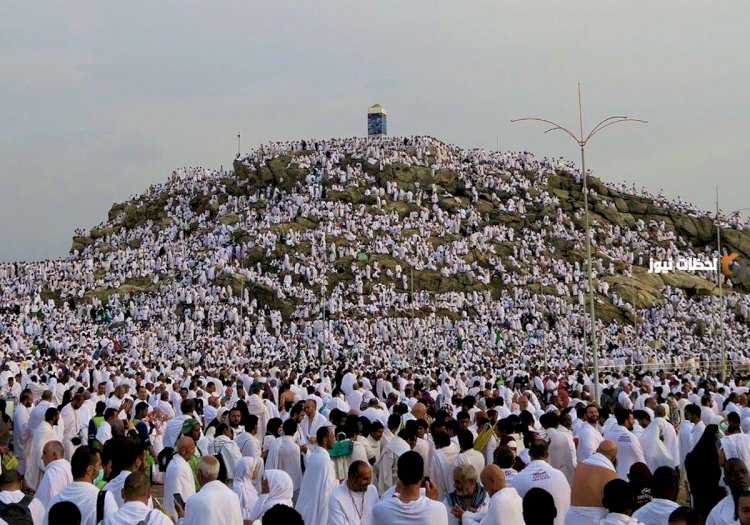


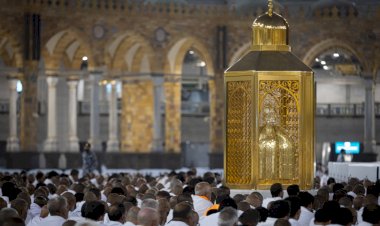
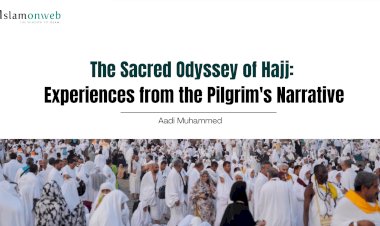
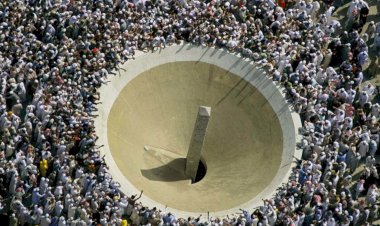
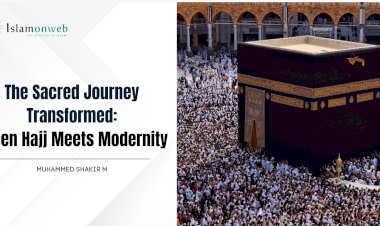
















Leave A Comment